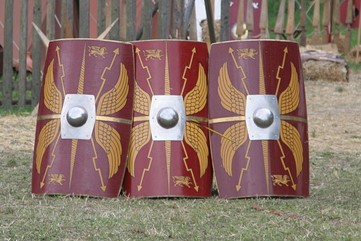Kyle Skaggs urges Christians to use the spiritual armor of Ephesians 6 in engaging in apologetics.
As I was working towards my degree at Dallas Baptist University I did volunteer work with an online ministry. There, I encountered people from all walks of life; all of them having questions about Christ and Christianity. For a while, I was doing well. I found joy in encouraging and counseling other believers. I also learned to tell the difference between non-believers who were willing to listen and those who were only there to argue.
Around a week from graduation I logged to the ministry’s website feeling confident. I’d spent hours reviewing various arguments and counterarguments, I was certain I would use what I had learned over four years to lead the conversation to the Gospel. This was not what happened. Instead, the people I talked to became either confused or frustrated before leaving. Figuring I was just having one of those bad days, I thought nothing of it. The same thing happened the next day. Now I was conflicted. I wondered why I was ineffective, because everything I said was supported by Scripture, so I logged off and puzzled over what I was doing wrong. While I was lost in my thoughts, a very clear voice in my head said, “You cannot lecture people into the Kingdom of God.” I had forgotten 1 Peter 3:15; “Always be prepared to give an answer to everyone who asks you to give the reason for the hope that you have. But do this with gentleness and respect…” That rebuke from the Holy Spirit sent me on a journey of reflection on the spiritual skirmishes that we so easily lose sight of in our daily routine.
Spiritual Warfare
“Enemy-occupied territory—that is what this world is. Christianity is the story of how the rightful king has landed, you might say landed in disguise, and is calling us all to take part in a great campaign of sabotage.” {1} Our adversaries are the rulers, authorities, and the powers of this dark world. (Ephesians 6:12) Every ideology, philosophy, and worldview not of the Gospel is controlled by the spiritual forces of darkness.
The devil knows his time is short (Revelation 12:12), so he is intent on dragging as many souls down with him as he can. To his annoyance, if you have already been saved by grace through faith, and are now saved, you are called to make disciples of all nations (Matthew 28:19). He is resourceful, and if he can’t stop you from having a relationship with God, then he will use every trick to make you as ineffective as possible in your walk with Christ, and in evangelism.
The Devil and his forces are relentless. Whenever we attempt to evangelize, every gap in our defenses can and will be exploited. How are we Christians to contend with these forces of darkness? Paul tells us to put on the full armor of God so that we can take our stand against the Devil’s schemes. Let’s take a look at the parts of the spiritual armor God provides.

The Belt of Truth
First, we must remain grounded in the truth. Ephesians 6:14 refers to the Belt of Truth, which holds our equipment within easy reach. When we face an enemy whose only weapons are lies and deceptions, we have the advantage. We have nothing to hide! All we need to do is tell the truth!
To wear the belt is to be ready. There has been increasing pressure to ignore fundamental Christian teachings for the sake of convenience. Do not do this. Know your scripture and gird yourself in the truth of the Gospel.
The Helmet of Salvation and the Breastplate of Righteousness
Second, we must wear the helmet of salvation (Ephesians 6:17) and the breastplate of righteousness (6:14) to turn aside any attacks that slip through our defenses. In those days, just as it is now, the helmet and breastplate are essential equipment to protect the head and the heart, and just one of the things separating the true soldier from the levy and the ad hoc militia.
In the same way, the certainty of our salvation and the righteousness of Christ are key pieces of our armor. As I have said before, Satan is ruthless. He will use every sin you have committed to shift your focus away from those who need Christ, and onto yourself. Being assured of our salvation and our righteousness before God is our greatest defense against these attacks.
The Gospel of Peace
 What made the Romans such a formidable force? Discipline and adaptability. Being able to march long distances and maneuver across a variety of terrain. Timing and distance determine the victor of any confrontation. To do this, they needed shoes that were durable and able to grip the ground firmly.
What made the Romans such a formidable force? Discipline and adaptability. Being able to march long distances and maneuver across a variety of terrain. Timing and distance determine the victor of any confrontation. To do this, they needed shoes that were durable and able to grip the ground firmly.
With the readiness that comes from the Gospel of Peace (Ephesians 6:15), we can rapidly move to where the Lord needs us. “[God’s Soldier’s] movements are dictated by the needs of the Gospel witness.”{2}
The Shield of Faith
 We are also told to take up the Shield of Faith (Ephesians 6:16) to extinguish the flaming arrows of the evil one. The favored shield in the time Ephesians was written was the Roman scutum, a large shield that protected most of the soldier’s body, enabling the Romans to protect both themselves and each other in tight formations without sacrificing their defense when fighting in looser formations. Most deaths in ancient battles occurred after, during, and after a rout. Therefore projectiles were used to disrupt and to instill fear before the two sides met in melee. Standing firm against hails of projectiles was key to surviving the battle.
We are also told to take up the Shield of Faith (Ephesians 6:16) to extinguish the flaming arrows of the evil one. The favored shield in the time Ephesians was written was the Roman scutum, a large shield that protected most of the soldier’s body, enabling the Romans to protect both themselves and each other in tight formations without sacrificing their defense when fighting in looser formations. Most deaths in ancient battles occurred after, during, and after a rout. Therefore projectiles were used to disrupt and to instill fear before the two sides met in melee. Standing firm against hails of projectiles was key to surviving the battle.
It is the same with all believers. Our faith is our primary defensive and offensive tool. People who have faith in Christ are willing to risk being made to look foolish. They are confident in the hope they have in Christ, and are therefore enabled to do great things. People who act out of faith inspire others to do the same. Our faith also protects us from the feelings, falsehoods, and ideas the Devil likes to use to discourage us. If we are discouraged from our walk, then we have already lost.
The Sword of the Spirit
 Finally, Ephesians 6:17 refers to the Sword of the Spirit, or the word of God. In conjunction with the scutum was the gladius, a short sword primarily used for thrusting and short cuts. It was the legionary’s primary weapon. After throwing their pila (specialized javelins) to disrupt the enemy formation, the Romans drew their swords and closed the distance to engage in hand-to-hand fighting. Their armor and discipline enabled them to weather the brutal melee far better than their opponents. Ideally, this caused the enemy to rout.
Finally, Ephesians 6:17 refers to the Sword of the Spirit, or the word of God. In conjunction with the scutum was the gladius, a short sword primarily used for thrusting and short cuts. It was the legionary’s primary weapon. After throwing their pila (specialized javelins) to disrupt the enemy formation, the Romans drew their swords and closed the distance to engage in hand-to-hand fighting. Their armor and discipline enabled them to weather the brutal melee far better than their opponents. Ideally, this caused the enemy to rout.
There is a good reason the word of God is described as a sword in other passages. It is absolute truth. Revelations 9:15 and Hebrews 4:12 describe God’s word as a double-edged sword. In Hebrews, Paul says “it penetrates even to dividing soul and spirit, joints and marrow; it judges the thoughts and attitudes of the heart.” Like a sword, learning to use God’s word effectively requires constant training. Christians should therefore study and seek to live according to the word so they can stand firm when confronted by the Enemy.
By being willing to close in, to deliver the word of God straight into the heart of the matter, shrewdly providing an answer for our faith with gentleness and respect, we can establish common ground with those who do not know Christ, thus opening the way for them to hear the gospel. We do this knowing full well that friends and even family may hate us for confronting the world. Because we are willing to push through, we are able to form relationships with people and show what it means to walk with Christ! As with Roman equipment in Jesus’ day, the armor of God is tailor made to allow us to safely close the distance with the enemy, and with the word of God, drive them from the field.
All we have to do is put it on.
Notes
1. Lewis, C.S. Mere Christianity, 1952.
2. Ellicott, C. J. (1970). Ellicott’s commentary on the Whole Bible Volumes VII-VIII: Acts to Revelation. Zondervan Publishing House. 1959.
©2024 Probe Ministries